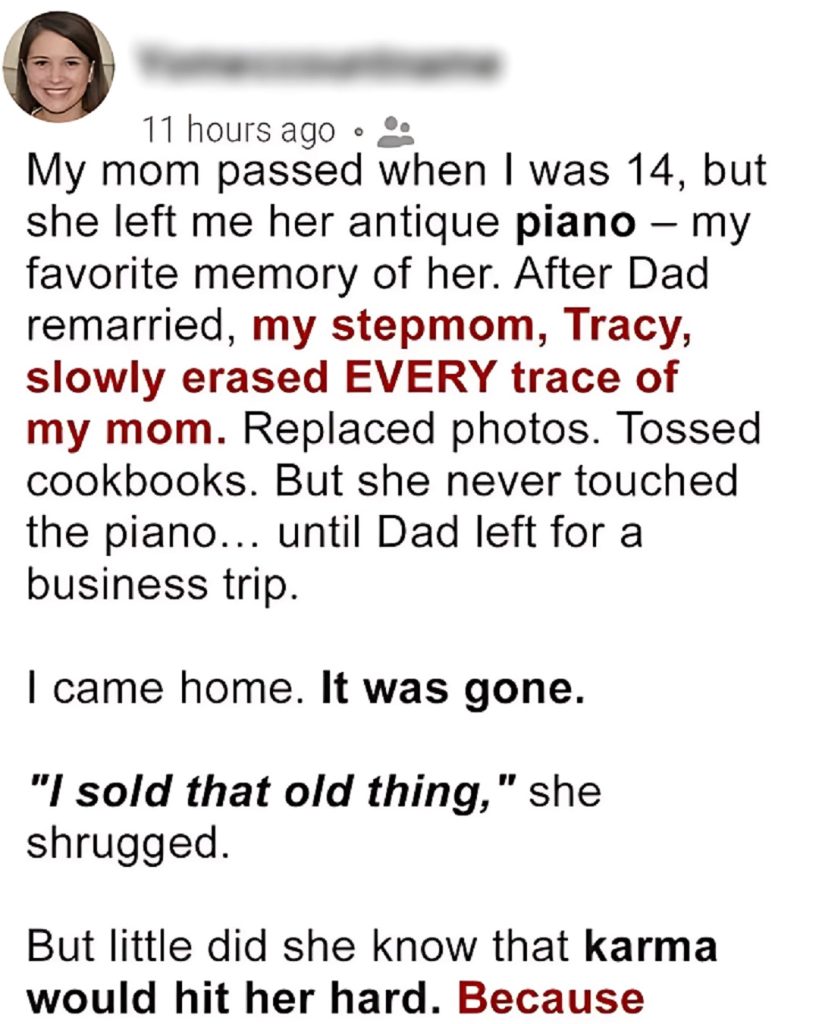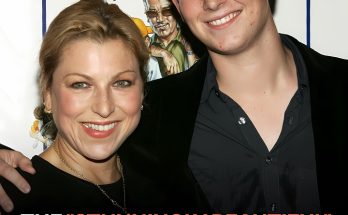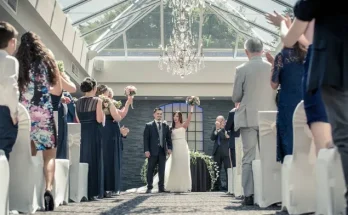When I was 14, my world cracked in half. That was the year my mom died—lung cancer, fast and cruel. But before she passed, she made me promise one thing:
**“Take care of the piano, baby,”** she whispered from her hospital bed, **“and whenever you play it, I’ll be right there with you.”**
It wasn’t just any piano. It was a 1920s upright, cherrywood with faded ivory keys and little carvings of roses on the legs. She taught me how to play on that piano. We’d sit for hours—her hands over mine—laughing at my clumsy fingers and celebrating every right chord like it was magic.
It *was* magic.
After she died, I played it every day. It was how I grieved. It was how I remembered. And honestly, it was the only thing in the house that still felt like *hers*… until **Tracy** moved in.
My dad remarried just a year later. Tracy was all smiles and polite words at first, but it didn’t take long to see what she really wanted—to erase my mom like she never existed.
She replaced every photo with new ones—just her, Dad, and her daughter Madison. She got rid of Mom’s cookbooks. Even her favorite mug vanished one day from the kitchen shelf.
But I held on to that piano like my life depended on it. It was in the den, and I made sure to play it loudly enough every now and then so Tracy remembered—it wasn’t hers to touch.

But one day, I came home from school… and it was gone.
Just **gone**.
I ran to my dad. **“Where’s Mom’s piano?”**
He didn’t even look up from the TV. **“Tracy sold it. Said it was old and taking up space. We can get you a keyboard.”**
I stood there, shaking. I didn’t scream. I didn’t cry.
But I swore: I would get it back. And Tracy would learn she couldn’t erase my mother.
I spent the next week hunting down that piano like it was a stolen treasure.
Craigslist. Facebook Marketplace. Pawn shops. I scrolled for hours, zooming in on every upright cherrywood listing.
**Then I saw it.**
A listing from a resale warehouse downtown. I took a bus the next morning before school, lied about being late for a dentist appointment.
The second I walked in, I saw it.
Scratched and dusty—but mine. **Hers.**
**\$300.** I only had \$78 saved from babysitting.
So I made a deal with the owner: I’d pay \$50 a week until it was mine. He agreed—said something about “kids who care about antiques” being a rare breed.
I babysat *everywhere*—two kids, five kids, pets, whatever. In a month and a half, I brought the final payment in cash. The man even delivered it to my aunt’s house across town, where I started staying on weekends.
Then I got smart.
See, Tracy didn’t just erase my mom’s belongings. She had also erased me from the house, slowly but surely. So I decided it was time to *flip the script.*
At school, we were allowed to submit a performance for the district’s spring arts showcase—one that would be **televised locally**.
I signed up to play.
And the day of the performance, there I was on stage, in a spotlight, with **my mom’s piano**—right where she said she’d always be with me.
I played the same piece my mom taught me—**her favorite.** My aunt recorded it and made sure my dad and Tracy saw it air that evening.
They looked *stunned*. Especially Tracy.
The caption read: *“Dedicated to my mother, who taught me that music is memory.”*
Two weeks later, Tracy tried to smooth things over. She claimed she thought I “didn’t want it anymore.”
I just smiled. **“Funny. You didn’t ask.”**
Dad looked ashamed. I didn’t say much else.
I didn’t need to.
The piano now sits at my aunt’s house. I visit often. And every time I sit down and let my fingers find those faded ivory keys, I hear Mom again—laughing, singing, loving me in the way only a mother can.



